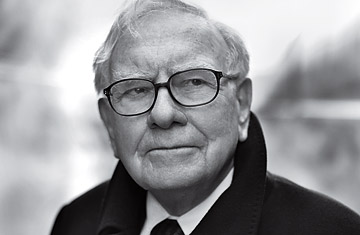
(4 of 9)
Buffett's maternal grandfather, writes Alice Schroeder in her excellent biography of Buffett, The Snowball, was an ardent supporter of Bryan. Buffett's father Howard, on the other hand, was a conservative; a grocer's son who went on to become a stockbroker and four-term Republican Congressman, he had an aversion to any sort of class system, as well as to debt. (He lobbied to put the U.S. back on the gold standard.) He was also an isolationist who agreed with Calvin Coolidge that the "chief business of the American people is business" and once passed out flyers calling Franklin D. Roosevelt and his welfare state the "greatest threat to democracy" that the U.S. had ever known.
Despite the political differences that would emerge between them, Howard Buffett was and is a hero to his son, in large part because he operated, both as a person and as a politician, by what Warren refers to as an inner scorecard. As Schroeder writes, Howard Buffett was "the least backslapping Congressman ever to represent his state." He once turned down a raise because his constituents had voted him in at a lower salary. And he was shocked by the way his peers padded payrolls with friends, relatives, mistresses and fake expenses. It was truly Mr. Smith Goes to Washington.
Howard's propensity for acting on the basis of his conscience deeply influenced his son. His picture hangs on the wall in Buffett's office, along with a few other treasured possessions--a diploma for completing a Dale Carnegie course on "how to make friends and influence people," a 1973 Pulitzer Prize for a story on financial mismanagement at Boys Town given to the Omaha Sun (which Buffett then owned; last month he bought the Omaha World-Herald) and the Presidential Medal of Freedom, awarded to him by President Obama.
Buffett's other hero is his first wife Susan Thompson Buffett, who suffered from oral cancer and died in 2004. She too had the inner scorecard. "In everything that's been written about me, I've never felt that my wife was remotely done justice to," says Buffett. "She was just an incredibly wise and good person. She didn't do things with a metric attached to them. She was just as interested in one person as in another. I couldn't say that about myself."
The two met in 1950 through Warren's sister Bertie, who attended Northwestern University with Susie. They married two years later, after Buffett had done a stint at Columbia Business School in New York City and gone to work as an investor on Wall Street and then for himself in Omaha. "She put me together," he says simply, and by all accounts, it's true. Susie was a born nurturer who took care of everything from dressing Warren to caring for their home and three children to arranging their social life and engaging with his family. Warren's mother Leila was a difficult woman prone to hysteria and vicious verbal attacks on her children. Susie headed her off and managed her needs so that Warren could be left to do what he was good at--making money.
